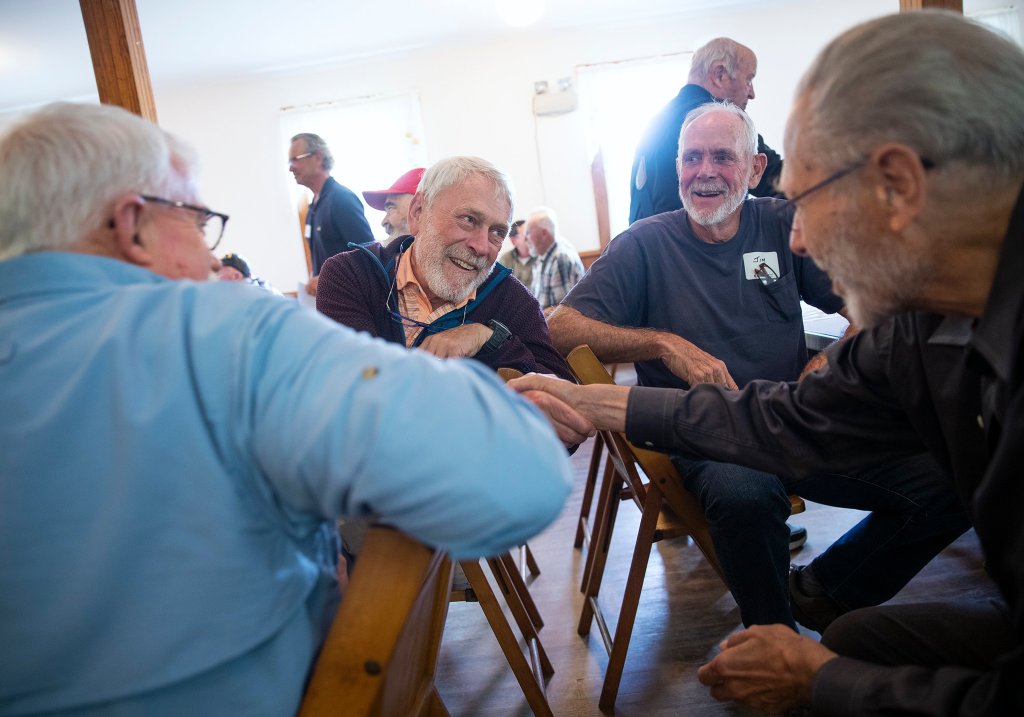
Once a month, from September through May, a few dozen older men in Harpswell get together for lunch, conversation and camaraderie at the Merriconeag Grange. Each luncheon includes a speaker on topics such as antique cars, veterans’ benefits or how to take better photos with your cellphone.
Known as the Harpswell ROMEOs — Retired Older Men Eating Out — it’s a gathering of over 50 guys, age 60 and up, who began meeting a year ago in a free program offered by Harpswell Aging at Home, one of Maine’s most active age-friendly community groups.
The volunteer-run group started holding luncheons after leaders noticed a lack of men at other activities they organized in this rustic seaside town of just over 5,000 people. It’s a local version of international ROMEO Clubs that aim to bring older men together and combat the isolation and loneliness that can challenge them.
Even busy seniors like Jim Hays, 76, look forward to the luncheons as opportunities to hang out with peers, enjoy a homemade meal and learn something new. Married with two sons and five grandchildren, Harpswell’s former harbormaster now spends his time golfing, traveling and volunteering with Harpswell Aging at Home.
“It really helps people stay connected who aren’t as busy as myself,” Hays said of the luncheons. “But I get a lot out of it, too. I meet somebody new every time I go, I enjoy listening to what the other guys have to say and I’ve yet to find a speaker program that I didn’t find interesting.”
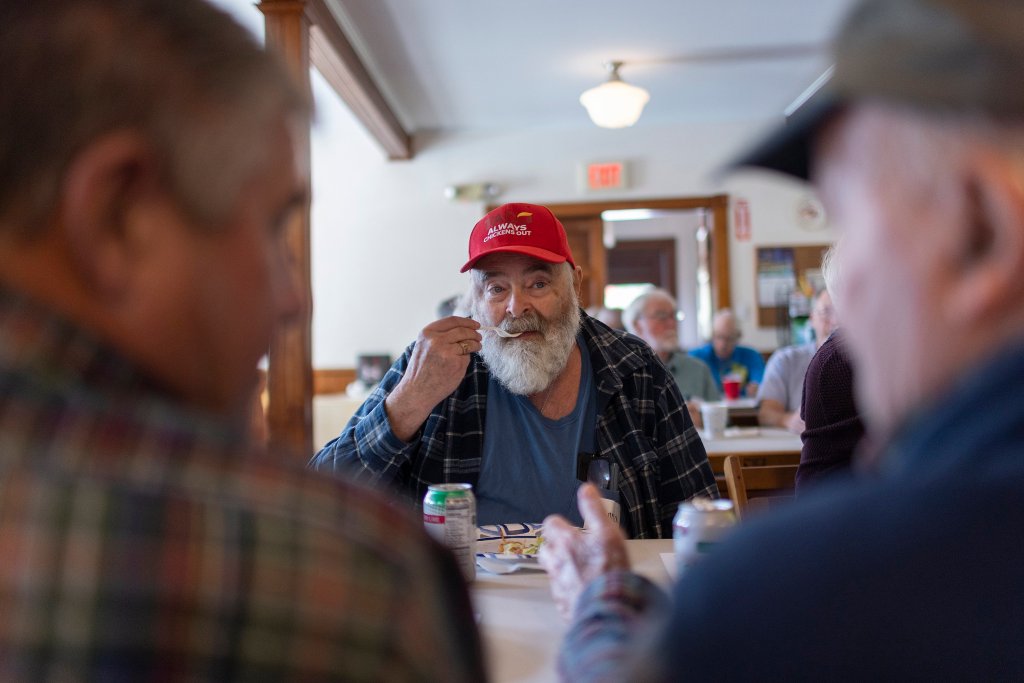
Harpswell’s ROMEO luncheons are among hundreds of senior supports and services that are available through age-friendly community groups and agencies across Maine. They are organizing activities, delivering meals, doing home repairs and providing rides to medical appointments.
Newer outreach efforts focus on men, immigrants, people of color and the LGBTQ+ community. They are helping older Mainers stay active, healthy and connected to their communities — and quite possibly adding years to their lives.
With the average life expectancy in the U.S. now exceeding 79, it’s more important than ever for older people to maintain a sense of purpose and belonging in their communities, said Jess Maurer, executive director of the Maine Council on Aging.
“This is universal, this aging thing,” Maurer said. “We’re living 30 years longer than we did 100 years ago. The question is, how are we going to do that well?”
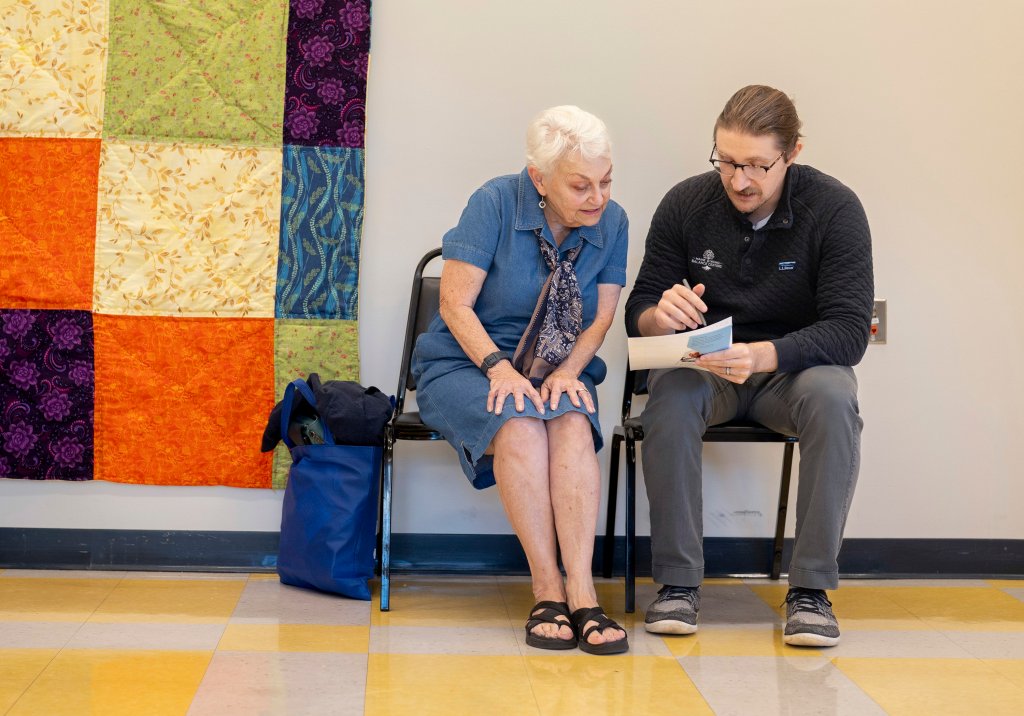
THE COST OF LONELINESS
The need for connection is especially acute in Maine. It’s the oldest state in the nation, with the highest median age (44.8 years) and the highest proportion of residents age 65 and older (23%), according to the U.S. Census.
Maine also is the second most rural state — 61.5% of residents live outside designated urban areas — a factor that makes it harder to access services and connect with others. Vermont is the most rural at 66.1%.
Living without community connections takes a toll. Studies show social isolation and loneliness diminish the health and longevity of older adults as they experience typical aspects of aging, such as bereavement and functional decline. Dementia risk increases 50%, risk of coronary artery disease or stroke increases 30%, and overall mortality increases 26%, according to a 2020 report from the National Academies of Science, Engineering and Medicine.
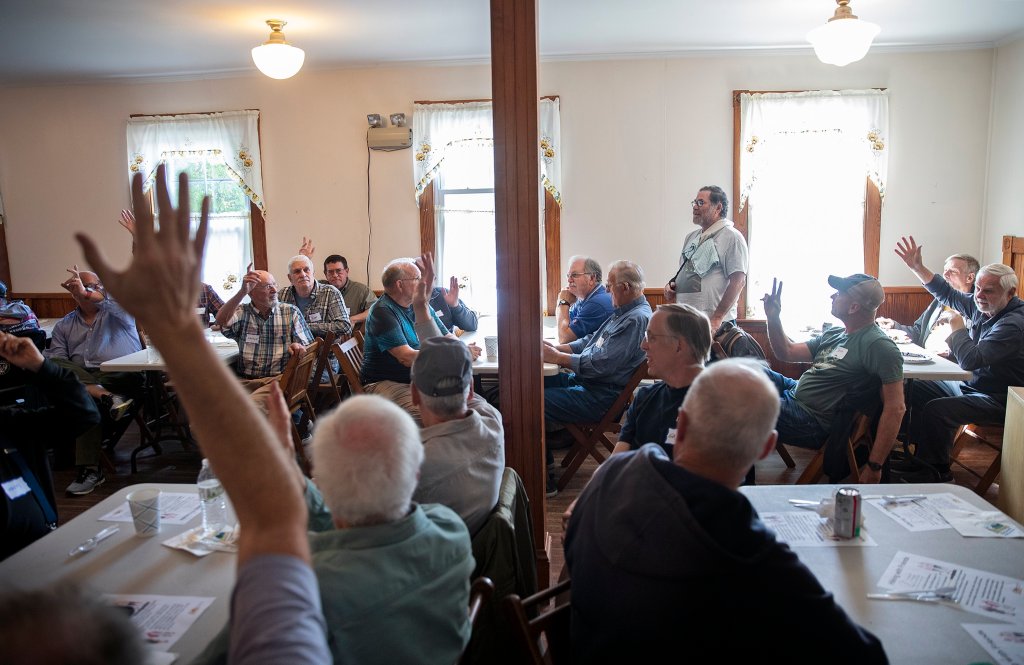
Sometimes isolation brings tragedy. A 2023 report from the U.S. Centers for Disease Control and Prevention found significant suicide rate increases among older men and women between 2001 and 2021. But men age 75 and up have the highest suicide rates in the nation — 38.2 deaths per 100,000 among men ages 75-84 and 55.7 deaths per 100,000 among men age 85 and older.
The volunteers running Harpswell Aging at Home don’t quote statistics when they’re promoting ROMEO luncheons — they don’t have to. Funded by donations, the program has a contact list of 117 men, ages 60 to 83. About 55 attend each month.
“We don’t say it’s about loneliness or isolation,” said Tom Mahoney, 70, the luncheon coordinator. “It’s just a chance for guys to get together and socialize. At the start of each meeting I say, ‘Introduce yourself to the guys at your table.’ They do and they just start talking.”
GATHER TOGETHER
All over the state, older Mainers are making similar connections with their peers.
EqualityMaine sponsors the Network for Older Adults, formerly SAGE Maine, which hosts monthly dinners in Augusta, Bangor, Ellsworth, Hallowell, Houlton and Portland; statewide virtual social hours, and other events for older members of the LGBTQ+ community.
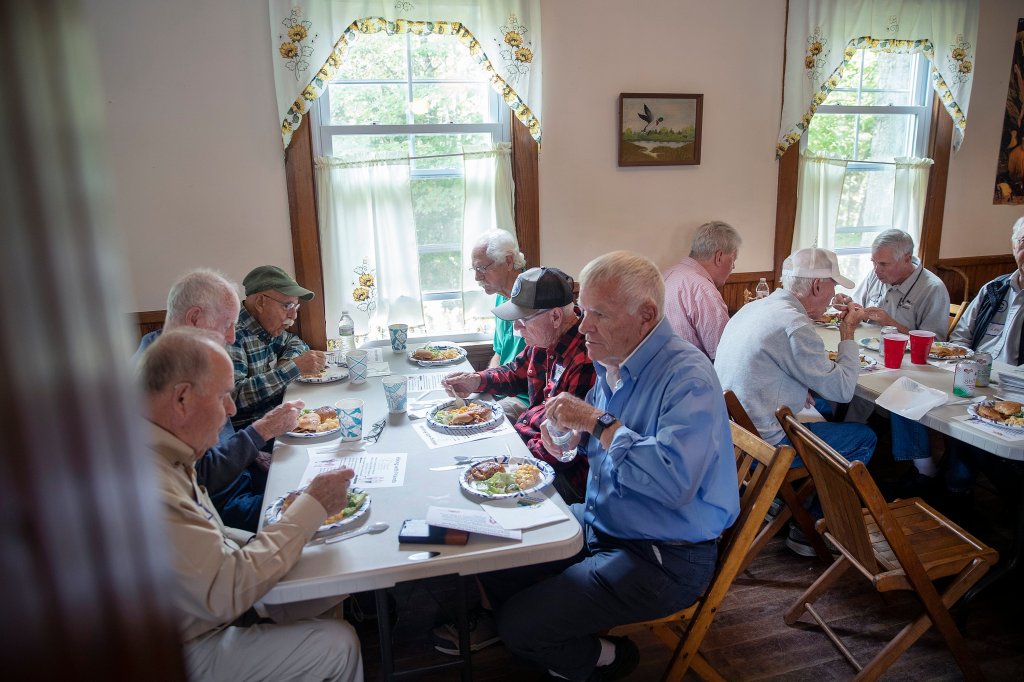
The Maine Council on Aging sponsors the Black, Indigenous and People of Color Elders Group as part of its Equity and Healthy Aging Initiative. The group gathers monthly, alternating between online and in-person meetings, which so far have occurred in Portland, Brunswick, Lewiston and Wales.
The group’s first project, “Making the Invisible Visible,” was a presentation of photos and stories by older Black Mainers exploring how they felt invisible in their day-to-day lives. When it premiered in January, some audience members were moved to tears.
“I didn’t know that so many Black people in Maine felt invisible,” said Leslie Hill, Bates College professor emeritus and convener of the BIPOC Elders Group.
In Her Presence is a Portland-based agency that works primarily with immigrant women, most of whom are from central African countries.
Early on, the older immigrant women made it clear that they were participating in the agency’s weekly English language and life skills classes in part as a way to socialize, said Claudette Ndayininahaze, co-founder and executive director.
Now, the older women are teaching younger women how to be seamstresses, and babysitting at Frances Warde House, a home for pregnant immigrant women and their children. More recently, the older women began teaching single, older immigrant men how to cook, and they cook for all of the agency’s board meetings and special events.
“The need to socialize is coming from them,” Ndayininahaze said. “The older men started reaching out and asking, ‘Why do you only serve women?’ Now, we have 53 older women and men in the group.”
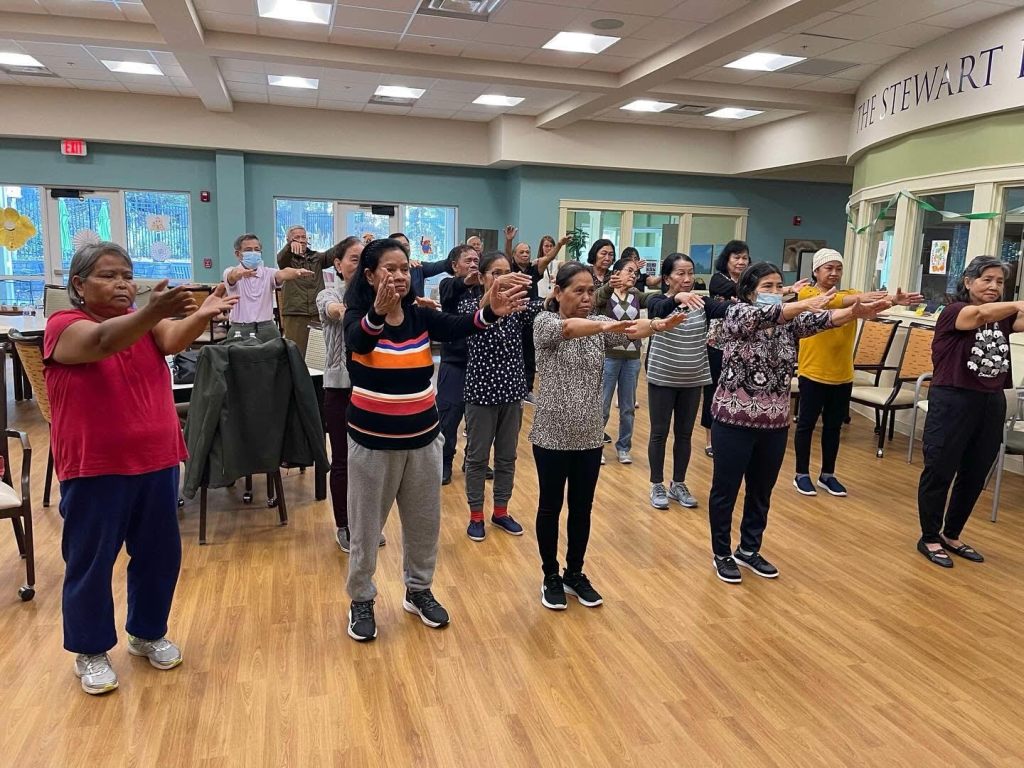
Khmer Maine, which was founded to serve the Cambodian community and has been working with the Southern Maine Agency on Aging, recently helped the agency establish a health and wellness class for about 30 Cambodian elders. They gather monthly to practice tai chi, learn about nutrition, fraud prevention and other subjects, and celebrate their culture with traditional food and dancing.
AGE-FRIENDLY COMMUNITIES
There are over 60 designated age-friendly communities in Maine from York to Lewiston to Fort Kent, some representing several towns. All are striving to make their communities more welcoming and responsive to people of all ages, including those with disabilities and chronic illnesses.
Mostly run by volunteers, the groups are affiliated under the banner of Lifelong Maine, which is overseen by the University of Maine Center on Aging and supported by AARP Maine. They are among 1,000 communities nationwide that have joined the AARP Network of Age-Friendly States and Communities since 2012.
Age-Friendly South Portland was the winner of the 2024 Beacon Community Award from AARP Maine. It organized volunteer programs to deliver sand buckets to seniors and shovel their walkways. It partnered with local officials to distribute 500 emergency supply kits to seniors. And it’s overseeing a pilot program that’s testing voice-activated smart home technology with 25 older residents.
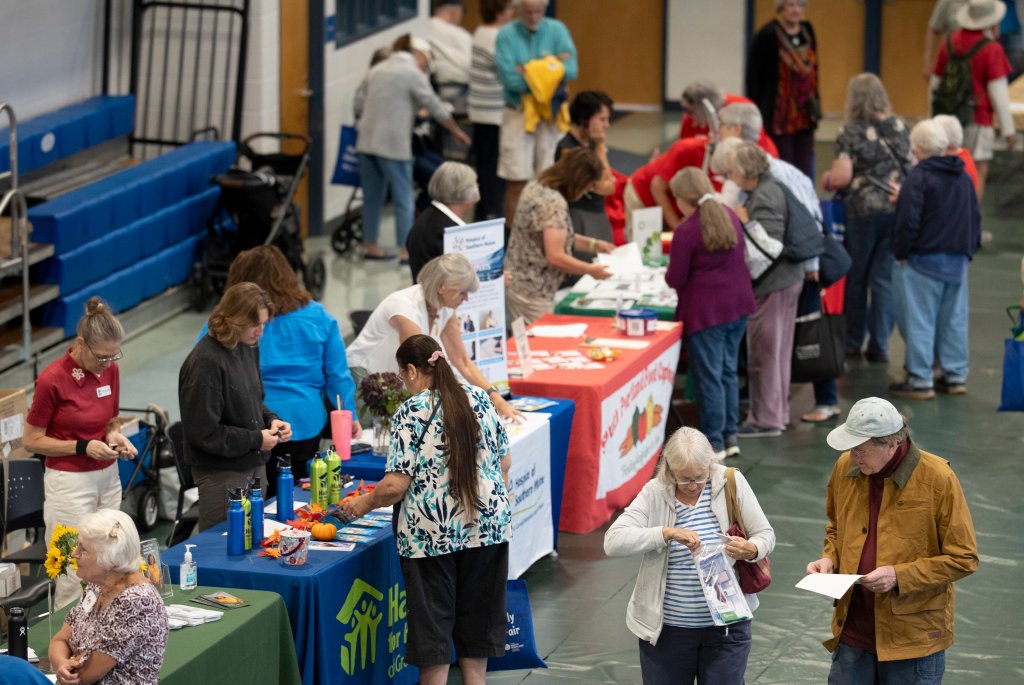
The group also hosts an increasingly popular Age Friendly Resource Fair each year that drew over 500 people and more than 45 vendors to the South Portland Community Center in September.
A critical service provided by some age-friendly organizations is transportation, especially in a state where public transportation is scarce and taxis and other ride options can be expensive.
One of the most successful programs is Neighbors Driving Neighbors, which provides free rides to residents of Belgrade, Fayette, Mount Vernon, Readfield, Rome and Vienna, all near Augusta.
Started 10 years ago, the nonprofit links volunteer drivers with people of any age who need rides just about anywhere within 35 miles. They can be for medical appointments, social events, grocery shopping or other errands. If someone is unable to leave their home, drivers can make grocery and pharmacy runs for them.
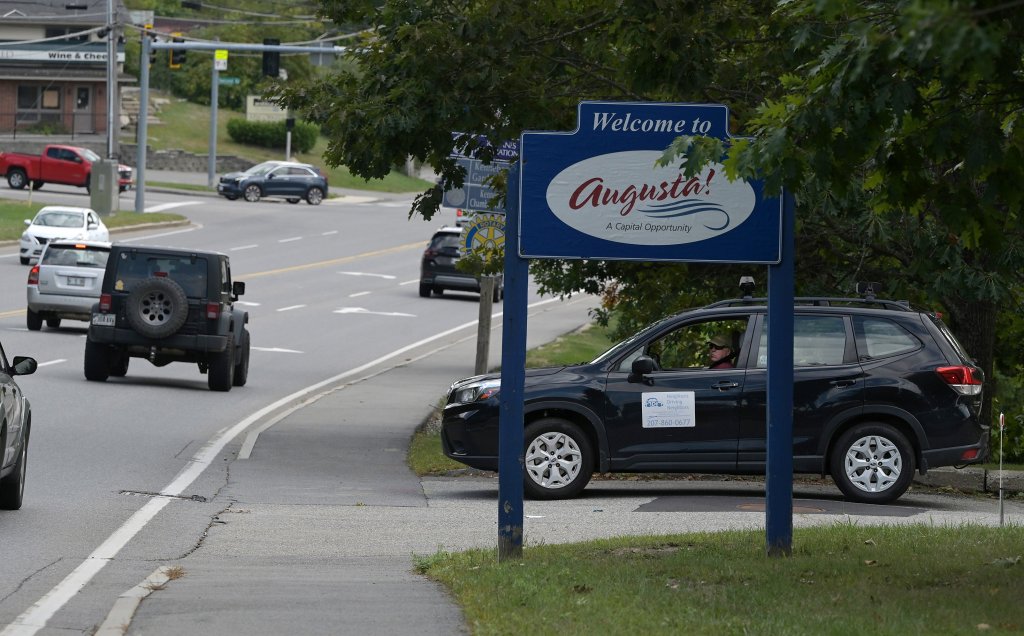
Funded by donations and small grants, the program has 132 regular riders and 63 drivers who provide their own vehicles and fuel, said Joe Austin, executive director.
“But we’re providing a lot more than rides,” said Austin, 71, a former dean of students at the University of Southern Maine. “Sometimes when I call to schedule a ride, I’m the first person they’ve talked to since their last ride two weeks ago. If I had my way, we’d have an organization like this in every community.”
Most of the volunteer drivers are in their 60s and 70s, including Steve Symonds of Belgrade, a former information technology manager for Hammond Lumber. He gives five or six rides each week.
“I get a great deal of satisfaction from helping people,” said Symonds, 67. “There’s a lot going on in their lives and I’m happy to take some of the worry off of their plate. The thanks I get is payment enough.”
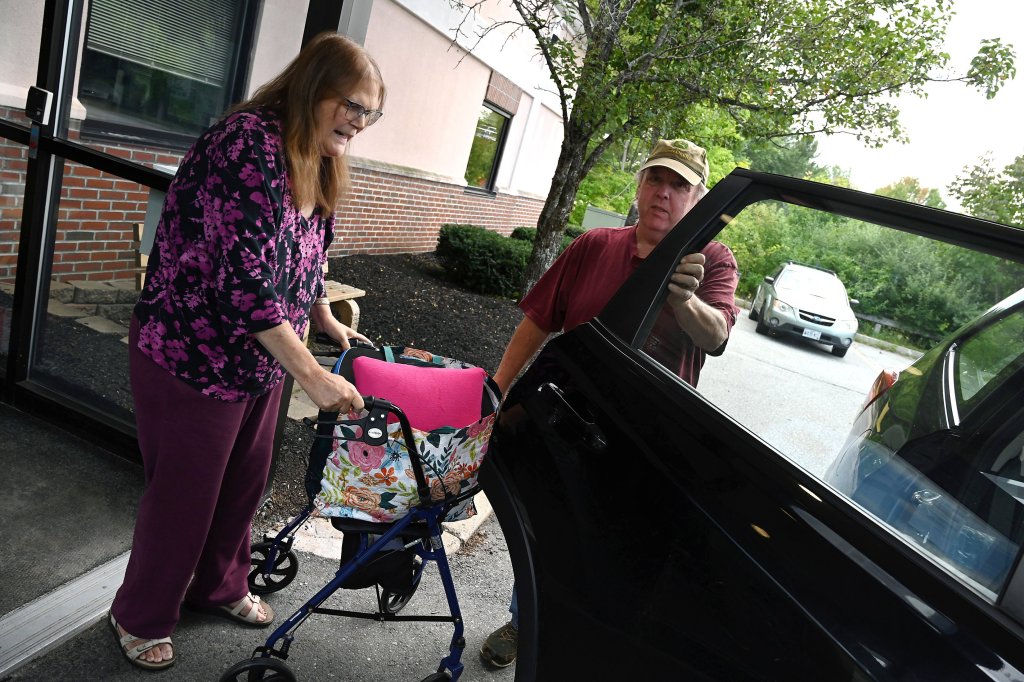
One of Symonds’ regular riders is Jayne Varney, 61, a Belgrade resident who has dialysis treatments three times a week in Augusta. A former bank teller, she uses a walker and is unable to drive. She said she doesn’t qualify for subsidized transportation programs and her partner cannot afford to take time off from work to take her.
“It’s not me to ask for help from anybody, but this program helps us,” Varney said. “This is life-preserving care and I am so grateful for the neighbors who do this for me.”
Our Aging in Maine series explores ways to prepare for retirement, navigate the challenges of growing older and deepen community connections. More stories will publish throughout October, and all articles will run in a special print section of the Maine Sunday Telegram on Oct. 19.


We invite you to add your comments. We encourage a thoughtful exchange of ideas and information on this website. By joining the conversation, you are agreeing to our commenting policy and terms of use. More information is found on our FAQs. You can update your screen name on the member's center.
Comments are managed by our staff during regular business hours Monday through Friday as well as limited hours on Saturday and Sunday. Comments held for moderation outside of those hours may take longer to approve.
Join the Conversation
Please sign into your CentralMaine.com account to participate in conversations below. If you do not have an account, you can register or subscribe. Questions? Please see our FAQs.